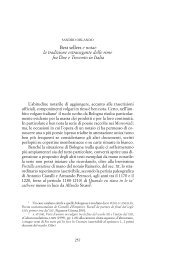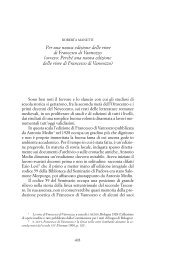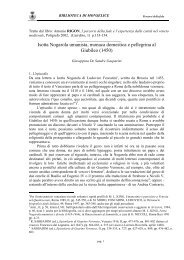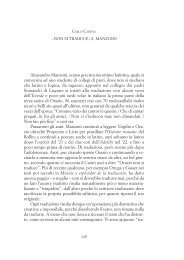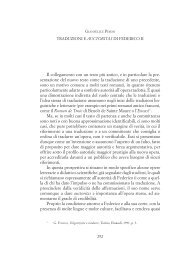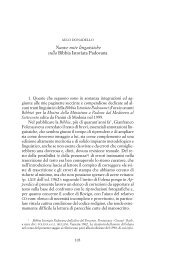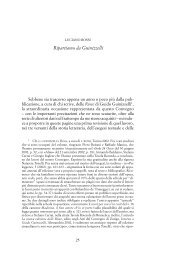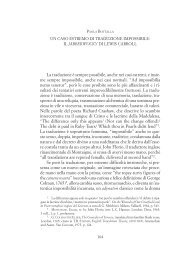Come si è tradotto Leopardi in tedesco nell'Ottocento - Provincia di ...
Come si è tradotto Leopardi in tedesco nell'Ottocento - Provincia di ...
Come si è tradotto Leopardi in tedesco nell'Ottocento - Provincia di ...
You also want an ePaper? Increase the reach of your titles
YUMPU automatically turns print PDFs into web optimized ePapers that Google loves.
pen<strong>si</strong>ero <strong>di</strong> <strong>Leopar<strong>di</strong></strong>, il quale <strong>è</strong> <strong>in</strong>catenato alla sua rupe mentre<br />
l’avvoltoio gli rode il fegato. Ma egli, <strong>in</strong>fles<strong>si</strong>bile, irride la potenza<br />
nemica.<br />
Sarebbe agevole trovare altre voci che alla f<strong>in</strong>e del secolo fanno<br />
<strong>di</strong> <strong>Leopar<strong>di</strong></strong> un eroe 26 , d’altronde ora <strong>in</strong>teressa piuttosto cogliere <strong>in</strong><br />
Heyse quella re<strong>si</strong>stenza a Schopenhauer e ai suoi adepti che f<strong>in</strong>isce<br />
per valorizzare – <strong>si</strong>a pure a modo suo – l’autonomia della lirica<br />
leopar<strong>di</strong>ana liberandola da ipoteche filosofiche. Ciò <strong>è</strong> ben compren<strong>si</strong>bile<br />
anche perché Heyse può approdare a <strong>Leopar<strong>di</strong></strong> senza dover<br />
pagare alcun tributo a Schopenhauer, date le sue assolutamente solide<br />
conoscenze della l<strong>in</strong>gua e della letteratura italiana. Egli <strong>è</strong> un<br />
italianofilo che <strong>si</strong> collega al partito degli italianofili della prima metà<br />
del secolo. D’altro canto la ver<strong>si</strong>ficazione facile che solitamente gli<br />
viene riconosciuta può servire a risolvergli numerose <strong>di</strong>fficoltà<br />
stilistiche, tanto che <strong>è</strong> pressoché impos<strong>si</strong>bile leggere nel suo testo<br />
ver<strong>si</strong> zoppicanti o pas<strong>si</strong> oscuri, se non del tutto errati.<br />
La traduzione <strong>di</strong> Heyse <strong>è</strong> <strong>in</strong> grado <strong>di</strong> superare barriere e scogli e<br />
<strong>si</strong> snoda veloce e <strong>si</strong>cura. E tuttavia <strong>si</strong> ha qualche volta l’impres<strong>si</strong>one<br />
che il testo <strong>di</strong> <strong>Leopar<strong>di</strong></strong> venga appiattito irrime<strong>di</strong>abilmente <strong>in</strong> una<br />
amabile parafra<strong>si</strong>, per non parlare della cancellazione dei punti ardui<br />
che può produrre l’errore vero e proprio. In An den Mond (Alla luna)<br />
ad es. <strong>è</strong> ottima l’<strong>in</strong>vocazione alla luna – “O lieblichklarer Mond” –,<br />
ma poi l’oggetto del ricordo <strong>si</strong> semplifica: “sovra questo colle / Io<br />
venia pien d’angoscia a rimirarti” passa a “Wie ich, ... von <strong>di</strong>esem<br />
Hügel, / Das Herz voll Schwermut, zu <strong>di</strong>r aufgeblickt”, e anche il<br />
succes<strong>si</strong>vo “come grato occorre [...] il ricordar” <strong>si</strong> semplifica <strong>in</strong> “O<br />
wie so reizend ist’s, [...] Zurückzudenken”. In Am Abend e<strong>in</strong>es<br />
Festtages (La sera del dì <strong>di</strong> festa) “und hier zu Boden / Werf’ ich<br />
mich stöhnend” riassume il ben più <strong>in</strong><strong>si</strong>stito “e qui per terra / Mi<br />
getto, e grido, e fremo”. Leggendo “De<strong>in</strong> lachend Augenpaar <strong>in</strong><br />
26 Si può vedere ciò che scrive Hans Grimm nel 1898: il <strong>si</strong>mbolo più bello per <strong>Leopar<strong>di</strong></strong><br />
sarebbe il capo dello schiavo morente <strong>di</strong> Michelangelo recl<strong>in</strong>ato su una spalla. Simile a<br />
questi <strong>in</strong>fatti anche <strong>Leopar<strong>di</strong></strong> avrebbe trascorso la sua vita nei ceppi, tutto <strong>in</strong>tento a fissare<br />
nella parola la tristezza per una giov<strong>in</strong>ezza mai goduta. Nello stesso tempo anche Grimm<br />
<strong>in</strong><strong>si</strong>ste sulla grecità <strong>di</strong> <strong>Leopar<strong>di</strong></strong>. H. GRIMM, <strong>Leopar<strong>di</strong></strong>’s hundertjähriger Geburtstag, <strong>in</strong><br />
“Deutsche Rundschau”, 95 (1898), pp. 212 sgg. L’avver<strong>si</strong>one che Heyse prova per il pes<strong>si</strong>mismo<br />
schopenhaueriano sta nel fatto che il fenomeno <strong>si</strong> <strong>di</strong>ffonderebbe “<strong>in</strong> strano contrasto<br />
con il glorioso slancio politico della nazione”. Dall’Introduzione del 1878, cit., p. 3.<br />
88



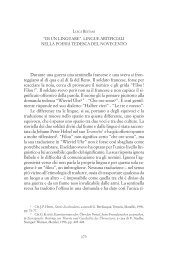
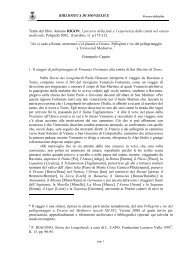

![Intero volume in formato PDF 6 MB circa [vai.] - Provincia di Padova](https://img.yumpu.com/16370153/1/174x260/intero-volume-in-formato-pdf-6-mb-circa-vai-provincia-di-padova.jpg?quality=85)
